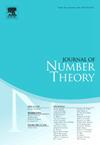类群的不变量部分和相对类群的分布
IF 0.7
3区 数学
Q3 MATHEMATICS
引用次数: 0
摘要
我们将Roquette和Zassenhaus关于类群的不变量部分的工作推广到相对类群。因此,我们可以显示一些统计结果如下。对于定数域K上的阿贝尔扩展,我们给出了相对类群的Sylow - p子群在p除扩展度时的无穷cp -矩。对于具有a4闭包的六次数域,当扩展运行在固定伽罗瓦三次域上时,我们可以证明相对类群的Sylow 2子群的c2矩是无限的。本文章由计算机程序翻译,如有差异,请以英文原文为准。
Invariant part of class groups and distribution of relative class group
We generalize the work of Roquette and Zassenhaus on the invariant part of the class groups to the relative class groups. Thus, we can show some statistical results as follows. For abelian extensions over a fixed number field K, we show infinite -moments for the Sylow p-subgroup of the relative class group when p divides the degree of the extension. For sextic number fields with -closure, we can show infinite -moments for the Sylow 2-subgroup of the relative class group when the extensions run over a fixed Galois cubic field.
求助全文
通过发布文献求助,成功后即可免费获取论文全文。
去求助
来源期刊

Journal of Number Theory
数学-数学
CiteScore
1.30
自引率
14.30%
发文量
122
审稿时长
16 weeks
期刊介绍:
The Journal of Number Theory (JNT) features selected research articles that represent the broad spectrum of interest in contemporary number theory and allied areas. A valuable resource for mathematicians, the journal provides an international forum for the publication of original research in this field.
The Journal of Number Theory is encouraging submissions of quality, long articles where most or all of the technical details are included. The journal now considers and welcomes also papers in Computational Number Theory.
Starting in May 2019, JNT will have a new format with 3 sections:
JNT Prime targets (possibly very long with complete proofs) high impact papers. Articles published in this section will be granted 1 year promotional open access.
JNT General Section is for shorter papers. We particularly encourage submission from junior researchers. Every attempt will be made to expedite the review process for such submissions.
Computational JNT . This section aims to provide a forum to disseminate contributions which make significant use of computer calculations to derive novel number theoretic results. There will be an online repository where supplementary codes and data can be stored.
 求助内容:
求助内容: 应助结果提醒方式:
应助结果提醒方式:


